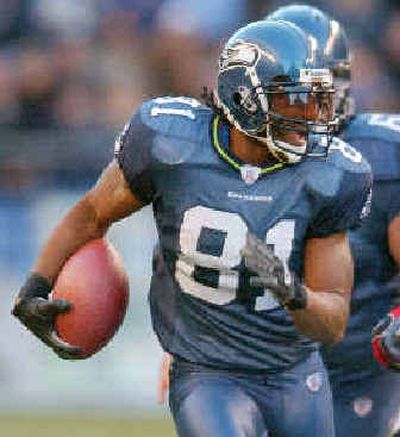Offensive questions surpass defensive needs

KIRKLAND – For an offense that was supposed to provide all of the answers, the Seattle Seahawks’ unit sure seems to have a lot of question marks.
The Seahawks got all 11 primary starters back from that side of the ball – including six free agents – yet could still be looking for help in this weekend’s NFL draft.
The most visible positions in question are at running back, where Shaun Alexander has been dangled in trade talk, and wide receiver, where Koren Robinson hasn’t exactly proven to be reliable over the years.
For now, it appears that both players will be back next season. League-wide interest in Alexander has been lukewarm, at best, and Robinson has apparently shown coaches that he’s ready to clean up his act.
Alexander hasn’t signed his one-year contract tender, and he’s told team officials that he plans to skip minicamps and training camp unless a long-term deal has been worked out. But that doesn’t necessarily mean he’ll be traded.
Last month, the Seahawks informed teams that they would be willing to take less than a first-round pick in exchange for Alexander, whose rights they continue to own because he was designated the franchise player. But there have been no takers, nor are there expected to be this weekend.
If Seattle is looking for a contingency plan, the draft could provide some options. The top three running backs – Cedric Benson of Texas and former Auburn teammates Ronnie Brown and Carnell Williams – are expected to go early. After that, there are plenty of productive college backs whose NFL potential is a matter of debate.
Florida’s Ciatrick Fason and Louisville’s Eric Shelton are possible second-round picks, while the middle and late rounds could include plenty of familiar names like Vernand Morency of Oklahoma State, J.J. Arrington of Cal, Marion Barber III of Minnesota, Frank Gore of Miami, Darren Sproles of Kansas State and Maurice Clarett of Ohio State.
Asked Wednesday about the running back talent beyond the top three, Seahawks president Tim Ruskell didn’t sound overwhelmed. He wouldn’t commit to whether anyone other than Benson, Brown or Williams could emerge into an every-down back.
“I don’t think you can get a consensus. I really don’t,” said Ruskell, whose team owns the 23rd pick in the first round. “So the answer’s probably no.”
Ruskell revealed a few weeks ago that trade talks involving Alexander might heat up on draft day. But with Buffalo’s Travis Henry and Indianapolis’s Edgerrin James also available – not to mention a lack of need for a starting running back on most rosters – the Seahawks’ phones probably won’t ring off the hook.
At wide receiver, the Seahawks have already added insurance behind Robinson. Veteran Joe Jurevicius was signed as a free agent, and Seattle already has some depth in Bobby Engram, Jerheme Urban, Alex Bannister, Taco Wallace and Jason Willis.
All reports are that Robinson has thus far fulfilled the promises he has made to the coaching staff, the main one being to attend counseling with a therapist. If he continues to abide by team rules, Robinson will probably regain his spot in the starting lineup.
But Robinson’s past – he served a four-game suspension for violating the NFL’s substance abuse policy last season and has been reprimanded by the team for numerous indiscretions – leaves reason for concern. Despite the depth at the position, Seattle might use the draft to add another young wideout.
This year’s draft doesn’t have quite the depth of the 2004 class, when seven wide receivers were selected in the first round. Michigan’s Braylon Edwards and USC’s Mike Williams are this year’s top-10 picks, while as many as four other receivers could go in the first round: Mark Clayton (Oklahoma), Troy Williamson (South Carolina), Reggie Brown (Georgia) and Roddy White (Alabama-Birmingham).
Anyone from that group could tempt Seattle at No. 23, but a plethora of defensive holes will probably lead the Seahawks to look toward that side of the football.
Defense has been the most obvious chink in Seattle’s armor lately.
But offense has its own set of question marks.
Brown may be on way out
The Chad Brown era in Seattle isn’t over yet, but it’s certainly on life support.
Team president Tim Ruskell confirmed that the team will likely release Brown in the coming days, opening the door for free agent Jamie Sharper to officially sign with the team.
Brown, who turns 35 in July, was asked to take a pay cut of more than $3 million for the upcoming season. He’s scheduled to make about $4.2 million in base salary, but the Seahawks want to cut his 2005 salary to $1 million. Brown has been unwilling to take that big of a pay cut.